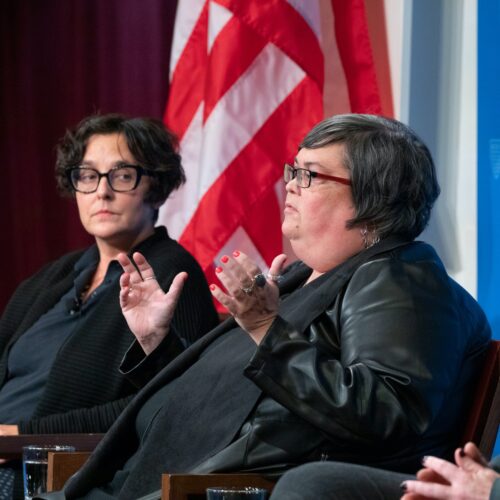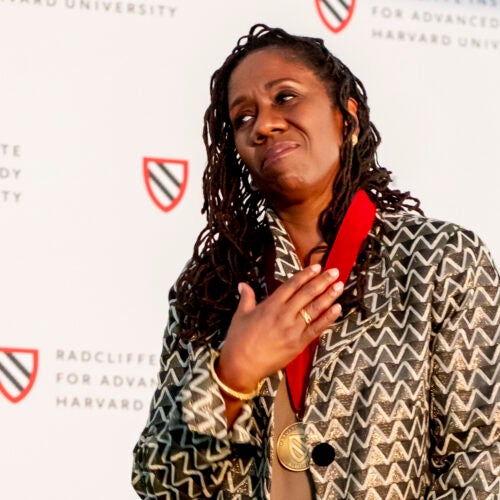How to protect democracy? Don’t give up on your neighbor – Harvard Gazette
At a time when U.S. neighborhoods are becoming disconnected from politics and disparate news sources are shaping views on various issues, many Americans are tempted to dismiss others as ideological lost causes unworthy of engaging in political discourse.
Wrong, says Anand Giridharadas. In his new book, The Persuaders: At the Front Lines of the Fight for Hearts, Minds, and Democracy, Harvard Radcliffe Fellow argues that debate is a fundamental principle of democracy that we cannot afford in the face of anti- democratic threats.
Giridharadas spoke to the Gazette about the book and what he will be working on during his time at Radcliffe. He will speak Wednesday at the Brattle Theater with Deval Patrick, former Massachusetts governor and now co-director of the Kennedy School’s Center for Public Leadership. The interview has been edited for clarity and length.
GAZETTE: Why is persuasion such an essential part of democracy?
GIRIDHARADAS: For most of human history, the prevailing notion of how to make decisions about the future has been that kings and queens, emperors and tyrants should do so. It was too hard, too complicated, too chaotic to let us all shape the future through debates, talks and decisions. In the last few hundred years there has been a radical turn where the dominant view has become that it’s best if we shape the future – people shape the future – through debate and discussion and argument and then through decisions. And that these decisions are made better and certainly more legitimately when everyone has a say.
Right now we are at a moment where we are falling behind from that democratic consensus. We see a fascist threat on the right. The political right in the United States is now essentially a fascist movement: there is a belief in overturning elections and thereby suppressing the will of the people; There is a belief in political violence as a legitimate tool to achieve your goals. But also, more subtly across the culture, rather than just on one side, there’s a kind of grand write-off where people generally assume that people who disagree with them or are on other sides of various divisions are irretrievable, monolithic are committed to these views and will never change. We have entered a crisis of conviction that is in many ways a crisis of liberal democracy. When, as a society, we lose faith in the idea that we can change things by changing our minds, that we can shape the future by arguing and haggling and speaking out through words and votes, then essentially we are demanding one Civil war, we ask for tyranny, we ask for these decisions to be made for us.
I was very disturbed by what struck me as the rise of some kind of anti-persuasive culture — this idea that we’ll never be able to change those who disagree with us — and decided to spend time with a group of To spend people who refused the big write-off, organizers and activists and people in politics who still believe in belief and change things by changing their mind.
GAZETTE: What drives our willingness to write each other off so quickly?
GIRIDHARADAS: Social media is a very big part of the story. The basic appeal of social media is toward hate speech rather than any sort of bridge-building or empathetic response. It has inspired many of us, myself included, to rely on shame and peer pressure as political tools with little evidence that they are effective. It also has to do with billionaire media outlets that have benefited from the split in other ways.
There’s also the fact that a policy of courtesy and trusting the other side didn’t really do much when you’re under 40. There’s a reason you’re seeing Gen Z and Millennials turning away from these political values. I think there’s also a sense that there are very wealthy and powerful people that I wrote about in my previous book who are hellbent on gaining more and more wealth and power and have done so incredibly effectively. Appeals to kindness just aren’t appropriate for this group’s types of devastation. So for many reasons you have a more flamboyant political culture, a more confrontational political culture.
GAZETTE: What persuasion strategies and techniques are most effective for cutting through the noise?
GIRIDHARADAS: One of the most interesting myths is that persuasion has become impossible. It is certainly true that political persuasion is more difficult in the age of polarization. The number of people commuting back and forth, certainly between the parties, is fewer than at other times in history. However, with every issue, there is well-documented evidence that a significant number of people, enough to make an enormous difference in the shape of your life and mine, are constantly changing their minds about all sorts of things. Donald Trump won the first time and lost the second time. You can say “Everyone who voted for him is that” or “Everyone who voted for him was that.” I’ve said as much of this stuff as anyone. But the fact is that some people liked him the first time, disliked him the second time. What many organizers are showing is that there is still room to move a significant number of people – maybe not half the population, but 5, 10, 20, 30 percent of the people – on certain issues.
Here are some of the insights that the democracy movement needs to take up and embrace. You meet people where they are. Having more room to move for people who don’t quite get it, who don’t use the right terms, but their hearts are in the right place. Who, frankly, are suspicious or nervous of some of the ideas they hear from sections of the pro-democracy side, but who dislike overt racism and white nationalism even less. We, as a movement, are often more interested in controlling their entry than in saying, “Come in.”
Second, I think the pro-democracy side needs to be more conflict-prone and combative. The idea of going high when they’re low was a disaster. What you see in people like [California Gov.] Gavin Newsom and others are the hunger many Democrats have to see candidates capable of starting fights and naming bad guys when there are bad guys. It’s okay to be a little angry and mix it up a little to make people’s lives better.
GAZETTE: Both Democrats and Republicans are telling potential voters that Democracy is up for election in November because of the actions of the other party. is that accurate How do you see the midterms?
GIRIDHARADAS: Just because both sides tell you the other side will end democracy doesn’t mean both sides will end democracy. There may be people who are ardent, committed fascists in the Republican Party leadership and others who are just “scare cats.” But it doesn’t matter if no one takes the view that elections are irreversible things and that political violence is something that doesn’t play a role in politics.
And so the burden on the left and on the pro-democracy side is immense at the moment. It runs to support the idea of democratic life – liberal democracy itself. And my concern at the heart of this book is that it’s not up to the task in its current form. It has the right ideas; it has many of the right guidelines; it has its heart in the right place. But there is a moral complacency. No matter how righteous you are, no matter how right you are on the right side of history, it’s not enough to be right about the future—you have to sell it, especially to those who are skeptical. And what I see is a pro-democracy movement that doesn’t even turn on many of the key engines to persuade people. They don’t even really compete.
GAZETTE: What will you be working on at Radcliffe this year?
GIRIDHARADAS: All my books are based on my own reporting. It’s exciting to have this first-person connection to the topic, but it also limits the range of what you can cover. So I’m trying something completely different. It’s the germ of a book, but who knows? Maybe an art project, maybe a documentary. I don’t know what final form it should take. But it is an attempt to take a more complex, diverse biopsy of American body politics in this moment of confusion and fracture and pain and aspiration.
Part of the angry, confrontational, polarized culture we’ve fallen into is that it makes us forget about human complexities. It causes us to think that other people are easily a thing and have a story. But it’s almost never true and it diminishes our political options when we start assuming that there is only one story about people. I’m trying to do a project that shows how complicated people are, different Americans who traditionally seem to be on different sides of an issue, but actually have more in common than we think.
Related

